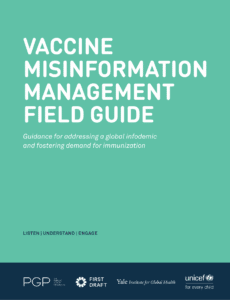Misinformation Alerts
Knowing what misinformation is being shared can help you generate effective messaging.
These insights are based on a combination of automated media monitoring and manual review by public health data analysts. Media data are publicly available data from many sources, such as social media, broadcast television, newspapers and magazines, news websites, online video, blogs, and more. Analysts from the Public Good Projects triangulate this data along with other data from fact checking organizations and investigative sources to provide an accurate, but not exhaustive, list of currently circulating misinformation.
Misinformation Alerts
Knowing what misinformation is being shared can help you generate effective messaging.
These insights are based on a combination of automated media monitoring and manual review by public health data analysts. Media data are publicly available data from many sources, such as social media, broadcast television, newspapers and magazines, news websites, online video, blogs, and more. Analysts from the Public Good Projects triangulate this data along with other data from fact checking organizations and investigative sources to provide an accurate, but not exhaustive, list of currently circulating misinformation.Alerts are categorized as high, medium, and low risk.
- High risk alerts: Narratives with widespread circulation across communities, high engagement, exponential velocity, and a high potential to impact health decisions. Are often more memorable than accurate information.
- Medium risk alerts: Narratives that are circulating in priority populations and pose some threat to health. Potential for further spread due to the tactics used or because of predicted velocity. Often highlights the questions and concerns of people.
- Low risk alerts: Narratives that are limited in reach, don’t impact your community, or lack the qualities necessary for future spread. May indicate information gaps, confusion, or concerns.
In a social media post, a pair of comedians promoted the misinformation that COVID-19 vaccines are experimental drugs that don’t meet the definition of a vaccine. The post, which received nearly 12,000 engagements, claims that the definition of a vaccine was changed to include COVID-19 vaccines, which they describe as a money grab.
Recommendation: One of the most common misconceptions about mRNA vaccines is that the technology used to develop them is new and untested. The virus that causes COVID-19, SARS-CoV-2, is part of a family of viruses called coronaviruses that have caused two epidemics in the last two decades alone. Because of this, scientists had a 50-year head start in understanding the genetic sequence and structure of the virus. With that knowledge, they were able to use innovative mRNA technology to quickly design and test potential vaccines. Continuing to debunk these false claims is recommended, as is emphasizing that billions of people around the world have been safely vaccinated. Fact Checking Source(s): 
A social media post with over 36,000 engagements falsely claims that Pfizer documents state that breastfeeding after vaccination is not advised. The post does not cite a source but it appears to be referencing a 2020 document from the Medicines and Healthcare Products Regulatory Agency, which stated that at the time of the document’s release there was not sufficient evidence to determine if breastfeeding was safe after vaccination. The document has since been updated to reflect the current data, which shows that breastfeeding after vaccination is safe for mother and infant.
Recommendation: There is understandable concern over whether COVID-19 vaccines impact pregnancy or breastfeeding. Recent studies show that receiving COVID-19 vaccines during pregnancy and breastfeeding is safe. Informational materials may emphasize that COVID-19 poses additional risks of severe illness, complications, and death to pregnant and breastfeeding people. Explaining that vaccination is suggested for people who are pregnant and breastfeeding is recommended. Fact-Checking Source(s): 
Several conservative news sites and commentators are promoting the false claim that the global outbreak of severe hepatitis in children is linked to COVID-19 vaccines. One article making this claim has been shared hundreds of thousands of times on social media. Health authorities have dismissed the connection because most of the children who have contracted hepatitis are unvaccinated. The U.S. outbreak is believed to be caused by adenovirus, a common virus that was detected in all the affected children.
Recommendation: The rise of severe hepatitis cases in children is causing understandable information seeking and widespread concern. Responding with empathy and acknowledging the concerns of parents is recommended, as is explaining that there is no evidence of a connection between the current hepatitis cases and COVID-19 vaccines. Informational materials may emphasize that COVID-19 vaccines have been rigorously tested to make sure that they are safe for all vaccinated individuals, including children, and that adverse side effects are extremely rare. Fact-Checking Source(s): 
Several trending social media posts, including one from a U.S. congressperson, falsely claim that Pfizer documents show that 1,223 people died in the first few months of the COVID-19 vaccine rollout. The posts have been shared over 60,000 times.
Recommendation: There is no evidence that the deaths that occurred during the vaccine rollout, when tens of millions of people were vaccinated, are linked to the vaccine. If millions of people engage in any activity, some number will die in the weeks and months after the activity. That doesn’t mean that the activity is the cause of those deaths. Messaging may emphasize that the COVID-19 vaccines are safe, effective, and cause only mild side effects. Emphasizing that side-effect reporting systems often contain unverified reports while directing to actual evidence is recommended, as is continuing to explain what mild side effects people can expect after vaccination. Fact Checking Source(s): 
An article on a conspiracy news site falsely claims that a CDC report shows that COVID-19 vaccines cause a 13,200 percent increase in autoimmune myocarditis. The study in question never mentions autoimmune myocarditis, which is an extremely rare form of myocarditis, which is itself a rare condition. The study did find a slight increase in myocarditis in male adolescents and young adults, but the overall risk of heart complications in the age group is much higher after COVID-19 infection than vaccination.
Recommendation: A small number of cases of heart inflammation in young adults following COVID-19 vaccination has caused understandable concern and information seeking. Organizations are recommended to address these concerns, and to update informational and educational materials accordingly if not done so already. Explaining that health authorities are monitoring reports of myocarditis and pericarditis, that cases are rare, and that the benefits of the vaccine greatly outweigh the risks is recommended. Fact Checking Source(s): 
A website known for publishing fabricated stories as real news posted an article that falsely claims that the U.S. military raided and destroyed a Moderna vaccine warehouse in Kansas City, Missouri. According to a Pentagon spokesperson, the story is completely false. Still, the fake story has been shared on social media.
Recommendation: Responding to each piece of misinformation may detract from priority talking points. Fact-checking sources:
A social media post claims without evidence that nurses are seeing a rise in blood clots, miscarriages, and Bell's palsy in vaccinated people. The post has received nearly 50,000 engagements. Anecdotes about health care workers seeing a “surge” in vaccine injuries have been circulating for over a year with no data to support the claims. Multiple studies have shown that vaccination does not increase miscarriage risk. While Bell’s palsy and blood clots are rare potential side effects of vaccination, the risk of both conditions is significantly higher in people with COVID-19 infections.
Recommendation: Explaining that stories about vaccine side effects are often drawn from unverified reports that have not yet been investigated by health officials is recommended, as is continuing to explain what mild side effects people can expect after vaccination. Fact Checking Source(s): 
In an interview, a physician who promotes misinformation about COVID-19 vaccines claims he has seen a rise in pregnancy complications in vaccinated women. The anecdote is unsupported by data. Several studies have shown that there is no link between COVID-19 vaccines and pregnancy complications.
Recommendation: There is understandable concern over whether COVID-19 vaccines could impact a pregnancy. Recent studies, however, show that COVID-19 vaccines are safe for both pregnant people and anyone trying to become pregnant in the future. Informational materials may emphasize that COVID-19 poses a risk to pregnant people; people who are infected during pregnancy are at increased risk for severe illness, hospitalization, preterm birth, stillbirth, and other pregnancy complications. Explaining that vaccination is suggested for people who are pregnant and breastfeeding is recommended. Fact-Checking Source(s): 
A social media post with nearly 1,000 engagements, including 350 comments, falsely claims that a keto (low-carbohydrate, high-fat) diet can remove spike proteins that the COVID-19 vaccine prompts cells to produce. This claim seems to be based on a misconception that proteins are simply nutrients, rather than vital molecules that carry out important biological functions. The human body has tens of thousands of naturally occurring proteins that support every bodily function. No diet removes these proteins or the spike protein from the body.
Recommendation: Emphasizing that the spike protein produced after vaccination is harmless and that no diet can remove it from the body is recommended. Messaging may also explain that some COVID-19 vaccines give cells instructions to produce a spike protein that is similar to the spike protein that SARS-CoV-2 uses to enter the cell. Without the rest of the virus, the spike protein is harmless and trains the immune system to recognize and fight the real virus. The mRNA that produces vaccine spike proteins breaks down and leaves the body within a few days of vaccination. Fact Checking Source(s): 
A social media post has resurfaced the false claim that the American Red Cross does not accept blood donations from people who are vaccinated. The American Red Cross website clearly states that people vaccinated against COVID-19 are welcome to donate blood, platelets, and plasma.
Recommendation: Responding to each piece of misinformation may detract from priority talking points. Fact-checking sources:
Alerts are categorized as high, medium, and low risk.
- High risk alerts: Narratives with widespread circulation across communities, high engagement, exponential velocity, and a high potential to impact health decisions. Are often more memorable than accurate information.
- Medium risk alerts: Narratives that are circulating in priority populations and pose some threat to health. Potential for further spread due to the tactics used or because of predicted velocity. Often highlights the questions and concerns of people.
- Low risk alerts: Narratives that are limited in reach, don’t impact your community, or lack the qualities necessary for future spread. May indicate information gaps, confusion, or concerns.
Vaccine Misinformation Guide
Get practical tips for addressing misinformation in this new guide. Click image to download, or see highlights.

